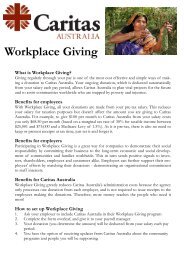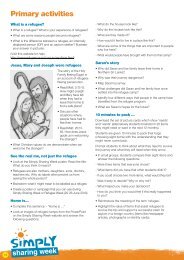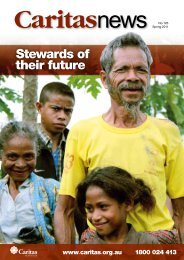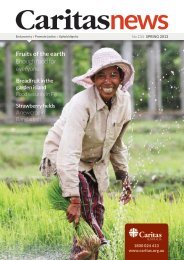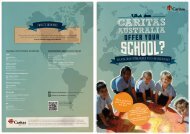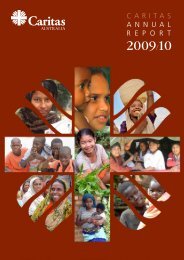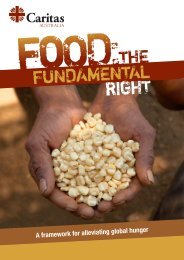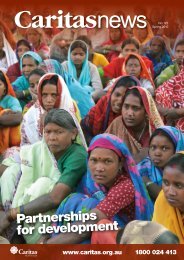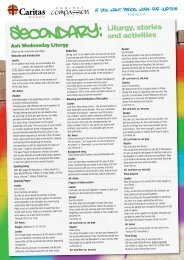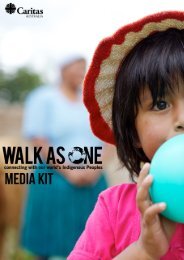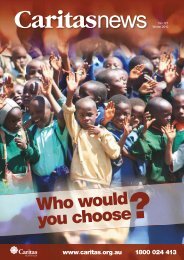In conversation with joanita fatima - Caritas Australia
In conversation with joanita fatima - Caritas Australia
In conversation with joanita fatima - Caritas Australia
You also want an ePaper? Increase the reach of your titles
YUMPU automatically turns print PDFs into web optimized ePapers that Google loves.
Womenin thespotlightNo 125Winter 2011
For the women of NPY lands,employment may be a thing of theimagination but accessing income iswell <strong>with</strong>in grasp. <strong>In</strong> 2009, <strong>Caritas</strong><strong>Australia</strong> embarked upon a three yearpartnership <strong>with</strong> the NPYWC insupport of the Tjanpi Desert Weaversinitiative. Through the art of grassweaving, the project enables upwardsof 300 women to generate income onthe land, ensuring their own livelihoodsand indirectly supporting communitiesacross the red centre.Throughout the year, the Tjanpicrew travel throughout NPY landsconducting grass weaving workshopsfor <strong>In</strong>digenous women. Through theseworkshops – ranging from three days totwo weeks – women learn the skills tocollect and dye grass, to weave basketsand sculptures, to sell and promote theirart, and to manage their subsequentincome. But like all <strong>Caritas</strong>-supportedprojects, engagement <strong>with</strong> thesevulnerable communities does not endwhen the trucks leave town.The strength of the Tjanpi DesertWeavers initiative lies in its capacity tosupport <strong>In</strong>digenous women year round.Following their workshops, NPYWCArts Workers keep in contact <strong>with</strong>communities, enabling women to selltheir art through the Tjanpi website,at national exhibitions and in theNPYWC shop in Alice Springs.Our Tjanpi<strong>In</strong> 2010, NPYWC celebrated their30th birthday, and hundreds of womentravelled to Umuwa for the festiveoccasion. Among them was <strong>Caritas</strong>’<strong>Australia</strong>n <strong>In</strong>digenous Programs Officer,Joss Cutler, who experienced for herselfthe Tjanpi art of opportunity.“During the week of celebrations, theTjanpi Desert Weavers tent was a hiveof artistic activity. Many of the womenwere experienced weavers, but it wasgreat to see so many women trying theart for the first time.“The women learnt to create basketsand sculptures from grass – collectedfrom their lands and coloured <strong>with</strong>traditional dye. Their enthusiasm waspalpable and the women seemed to takea great deal of ownership for what theycall ‘our Tjanpi’.”Joss explains that at a time whenmany people have no option but to leavetheir communities in search of work,the weaving project empowers womenCARITAS NEWS winter 2011 | 5
to generate and utilise their income ontheir own terms.“Many of the women who participatein the weaving project are elderlybut that’s not to say they don’t haveconsiderable responsibility <strong>with</strong>in theircommunity. Extended family networksare integral to <strong>Australia</strong>’s <strong>In</strong>digenouscommunities, and so grandparentsoften have an important role to play inlives of children and younger membersof the family.“Through the weaving project,women earn an income that is steadyenough to enhance their dignity, butsmall enough to ensure that they aren’tburdened <strong>with</strong> providing for the rest ofthe community.”<strong>In</strong>come for lifeThroughout <strong>Australia</strong>’s <strong>In</strong>digenouscommunities, diabetes prevention andcare is a major health challenge. <strong>In</strong>particular, access to end stage renalcare is an increasingly pressing issue inmany remote Aboriginal communities.With your generosity, <strong>Caritas</strong><strong>Australia</strong> supports an extensivecommunity-based DiabetesManagement Program across sevenremote communities in the Kimberleyregion of north-western Western<strong>Australia</strong>. The program specificallytargets vulnerable communitiesthrough a range of community healthinitiatives. But as evidenced in work<strong>with</strong> NPYWC, community healthprograms are not the only way wecan work to promote wellness for<strong>In</strong>digenous peoples.As Joss explains, “the Tjanpi weaverstend to be older women and becauseof the nature of health care in theircommunities, they are often caring forsick members of the family or are sickthemselves.“For these women and their families,access to health services is extremelydifficult and sadly, access to culturallyappropriate health services is apipedream. So when someone is unwellit is a heavy burden for the rest of thecommunity – more so than for non-<strong>In</strong>digenous <strong>Australia</strong>ns.“<strong>In</strong> addition to myriad physical andmental health challenges prevalentthroughout <strong>In</strong>digenous communities,many people of NPY lands increasinglystruggle <strong>with</strong> kidney problems as aresult of their diabetes.“End stage renal care is a huge priorityfor these women and their familiesand yet care is so far from reach. Thesecommunities have a massive problem<strong>with</strong> clean drinking water so bringingcare to communities is incrediblydifficult – there simply isn’t the freshand clean water required to utilise renaldialysis machines,” says Joss.As a result many women and theirfamilies must travel to metropolitancentres to receive the care they need.And thanks to the Tjanpi weavingproject, these families now have theincome to support themselves duringtheir time off lands.“Often when people do have to travelto Alice Springs for health care theyare faced <strong>with</strong> homelessness for theduration of their stay.“<strong>In</strong> addition to the income they cangenerate weaving on lands, the NPYcouncil offers women employmentopportunities as teachers, dyers andweavers in the Tjanpi Desert Weaversshop in Alice Springs.“For many women and theirfamilies this small income can meanthe difference between homelessnessand having a place to stay; betweenaccessing vital care and denying theirhealth to escape the inherent threats ofhomelessness.”Preserving a wealthof traditionAs a community of caritas committedto the eradication of extreme anddebilitating poverty, we have thepotential to enact profound change.Yet in our pursuit of robust and justdevelopment, we must be mindfulthat even the poorest communities aresteeped in a wealth of tradition.<strong>In</strong> our efforts to close the gap in<strong>Australia</strong>, we must not only ensureculturally appropriate opportunitiesfor <strong>In</strong>digenous communities, but alsoensure that communities are supportedin ways which enhance and build upontheir diverse cultural strengths.At its core, the Tjanpi DesertWeavers is a social enterprise. Beyondsimply enabling women to generateincome, the project aims “to keepThe average <strong>In</strong>digenoushousehold income isonly 62% of the nationalaverage; over half of<strong>In</strong>digenous people relyon <strong>Australia</strong>n governmentwelfare for income<strong>In</strong>digenous men are1.5 times more likelyto be employed fulltime than <strong>In</strong>digenouswomen in <strong>Australia</strong>Community healthcentres exist in 8.8% of<strong>In</strong>digenous communities– 30% less than thenational average6 | CARITAS NEWS winter 2011
culture strong, maintain links <strong>with</strong>country and empower the keepers andteachers of desert weaving to builda strong enterprise through which toshare their art and culture <strong>with</strong> theworld”.According to its mission, “Tjanpi isabout family and community – aboutwalyta.”As Joss experienced for herself,weaving is not simply a matter ofmaking and selling art. It offers womena space away from their daily lives to sitand talk – to share stories and discusschallenges in their communities.“I was struck by the way the weavingprocess creates a forum where culturecan flourish,” Joss explains.“Women collect the grass together,make dyes together and sit together ina circle as they weave. It allows themthe time out to talk about what’s goingon in their community – to learn fromeach other and honour their sharedexperience. It’s a really powerfulcommunity development tool!”Keeping tradition alive is of theupmost importance in <strong>In</strong>digenouscommunity development, yet isbecoming increasingly difficult forthese women and their families.“I was in a room of about 300women, all traditional owners of NPYland. When asked how many had afamily member or had themselves leftthe land to access health care, morethan half raise their hands,” Joss recalls.“When older people in particular,have no choice but to leave landsin search of health care, the wholecommunity suffers; teaching andsupporting cultural roles becomesmore and more difficult when peopleleave prematurely.“There is frustration forcommunities who are often unableto visit their family members, anda profound sense of loss for those<strong>In</strong>digenous <strong>Australia</strong>ns who know theywill not pass-away on their traditionalland. So for the most remotecommunities, it becomes extremelychallenging to preserve ceremony andculture in regards to Sorry Business.”A great strength of the Tjanpiweaving project is its capacity to generatewidespread support for Aboriginalwomen and their traditional culture. <strong>In</strong>addition to NPYWC’s own art spacein Alice Springs, its national travellingexhibition provides a space to promote<strong>Australia</strong>n <strong>In</strong>digenous culture throughthe stories and art of NPY women.Today, work created by the desertweavers is celebrated in galleries acrossthe country. The National Galleryof <strong>Australia</strong>, the National Galleryof Victoria, Queensland Art Gallery,the Art Gallery of South <strong>Australia</strong>,the Museum & Art Gallery of theNorthern Territory, and the NationalMuseum of <strong>Australia</strong>, are among thoseinstitutions who now own pieces of thewomen’s unique art.“Knowing that an artwork – createdby a member of your community – ison display and winning awards across<strong>Australia</strong> is a great sense of pride for thecommunity, it helps to keeps traditionaland cultural practices alive.”Partnership across<strong>Australia</strong>From 3-10 July 2011, <strong>Australia</strong>ns willcommemorate NAIDOC Week. Theweek of observance – first initiated in1974 by the National Aborigines andIslanders Day Observance Committee(NAIDOC) – is an opportunity for all<strong>Australia</strong>ns to celebrate and recognisethe rich cultural history that makesour country unique. Importantly, itis an opportunity for all <strong>Australia</strong>nsto celebrate the history, culture andachievements of Aboriginal and TorresStrait Islander peoples.For you, our generous andcompassionate supporters, NAIDOCWeek provides an opportunity toreaffirm your commitment to a just andinclusive <strong>Australia</strong> – rich in traditionand abundant <strong>with</strong> opportunity.Your partnership <strong>with</strong> <strong>Caritas</strong><strong>Australia</strong> is not just a partnership <strong>with</strong>thepoorestmembersofourinternationalcommunity. Together <strong>with</strong> our<strong>Australia</strong>n <strong>In</strong>digenous partners, it is yourcompassion and your steadfast supportthat will help <strong>Australia</strong> bridge the gap.Make a donation to <strong>Caritas</strong> <strong>Australia</strong>and together we can help Close the Gap.Please fill out the coupon enclosed, visitour website www.caritas.org.au or call1800 024 413 to make a difference today.CARITAS NEWS winter 2011 | 7
<strong>In</strong> <strong>conversation</strong> <strong>with</strong> Joanita Fatimaher decade of caritas in Timor LesteAfter four centuries ofPortuguese rule, two and half decadesof <strong>In</strong>donesian occupation, and yearsof civil unrest, Timor-Leste assertedits independence just 12 years ago.But the August referendum thatshould have marked an era of renewalinstead ignited a period of violentand merciless conflict. To say thatthe impact was devastating does noteven begin to describe the horror thatbefell the new nation in these years ofbloodshed.<strong>In</strong> the wake of the crisis ofindependence, <strong>Caritas</strong> <strong>Australia</strong>launched an emergency humanitarianresponse in Timor-Leste. Now – afteralmost 12 years working <strong>with</strong> Timor-Leste’s most vulnerable communities– <strong>Caritas</strong> <strong>Australia</strong> is one of the largestand most trusted NGOs in the country.Joanita Fatima has worked for<strong>Caritas</strong> <strong>Australia</strong> in Timor-Leste for thepast 10 years. She first joined <strong>Caritas</strong><strong>Australia</strong> in 2001 to work <strong>with</strong> thefemale victims of Timor-Leste’s bloodyconflict; today, she manages up to35 local development organisations aspart of <strong>Caritas</strong> <strong>Australia</strong>’s PartnershipsProgram.I have been working for<strong>Caritas</strong> <strong>Australia</strong> almost aslong as <strong>Caritas</strong> <strong>Australia</strong> hasbeen working for my country.I feel now that <strong>Caritas</strong> is mynew home.Before <strong>Caritas</strong>, I was astudent but I didn’t finish mystudy because of the crisis.<strong>In</strong> 1999 my father was killedand I could not continue;everything in Timor-Leste wasdestroyed.Since the crisis, sexualabuse is a big crime in Timor-Leste, and a woman could notalways get help. If a womanwas assaulted, the communitywould always blame the lady.They would ask “why don’tyou run away or fight back?”They say it’s the lady’s fault.One woman I met lived closeto the border between Timor-Lesteand <strong>In</strong>donesia. She needed to walk to<strong>In</strong>donesia to buy oilfor her lamp (in manycommunities we don’thave electricity) and asshe crossed the bordershe was assaulted bysix army officers. Shefelt that she had losteverything and stillher family believedthe assault was hermistake.Because of toomany stories just likethis, <strong>Caritas</strong> <strong>Australia</strong>started a trainingprogram aboutsexual violence andgender-based violencein Timor-Leste.We were workingacross 13 districts, trying to changecommunities’ attitudes – I feel so luckyto have been part of that first project,but it was a huge challenge.We started <strong>with</strong> just six women –we were very young women. We talked“We teachwomen thatthey havea power tostand upand tell thecommunitythat whathappened isnot right”about sexual assault but we often hadcomplaints made against us because ofour work. At the time, sexual assault – itwas taboo. We were women, and we wereyoung, so we didn’t have the right to talkabout it. But <strong>with</strong> our commitment tohelp our community we kept going.At the time, no one spoke Englishand though many organisationswanted to help, they had a difficulty incommunication. Eventually we started‘training the trainer’ and the programgrew; so we’ve taught communities howto teach themselves.From what it was like before, we haveseen so much change. Now the ladiesin our communities know how to makea police report; how to keep evidence;how to go to the hospital; and whichorganisations will be able to help them.They don’t need to be shy to look forhelp; they know who can help them <strong>with</strong>their trauma.Two years ago, the lady who wasassaulted by those six army officers cameto <strong>Caritas</strong> for counsellingand health care, and wehave helped her to regainconfidence by doingsmall activities in thesecurity of a safe house.Now she is able to talkto other people about herexperience and she hasbeen able to reunite <strong>with</strong>her family.Even when womenchose not to make areport to the court, wework <strong>with</strong> them toovercome their trauma.We teach women thatthey have a power. Theyneed to know: ‘somethinghas happened to you, butyou have power to standup and tell the community that whathappened is not right’.To learn more about <strong>Caritas</strong> <strong>Australia</strong>’s workthroughout Timor Leste visitwww.caritas.org.au8 | CARITAS NEWS winter 2011
Juntos de la mano aremos la diferenciaPartner <strong>with</strong> us to make a difference<strong>In</strong> classrooms across<strong>Australia</strong>, students of all ages havethe opportunity to be kids ofcaritas. Thanks in large part to thecommitment of Catholic EducationOffices around <strong>Australia</strong>, more than70,000 <strong>Australia</strong>n school studentspartner <strong>with</strong> <strong>Caritas</strong> <strong>Australia</strong> eachyear in pursuit of one just world.But in the rapidly changingeducation sector, it is not just thestudents we depend upon for support.Just as a shepherd leads his sheep,so too can our educators lead acommunity of compassion in <strong>Australia</strong>.And as <strong>Australia</strong>’s teachers worktirelessly to shape hearts and mindsin the classroom, <strong>Caritas</strong> <strong>Australia</strong>is proud to support teachers throughformation in the field.<strong>In</strong> January of this year, <strong>Caritas</strong><strong>Australia</strong>’s Global Education Advisorfor Queensland, Jenifer Byrne, andMargaret Fyfe, our Latin AmericanPrograms Coordinator, accompaniedeight Catholic Education Office staffmembers on a trip to the heart of Bolivia.<strong>In</strong>spired by <strong>Caritas</strong> <strong>Australia</strong>’swork, and eager to deepen theirunderstanding of authentic and lastingchange, the group travelled to Bolivia’sremote Yuquí-Yuracaré <strong>In</strong>digenousCommunity Lands, where <strong>Caritas</strong>has been working <strong>with</strong> local groups toestablish an ethno-tourism centre.As told through Rosa’s story inProject Compassion this year, this115,000 hectare territory truly exists onthe margins of Bolivian life: there areno roads, no phones and no electricity.For decades the indigenous ownersof this land have experienced conflict,debilitating poverty and widespreadinjustice.For the past decade <strong>Caritas</strong><strong>Australia</strong> has supported our localpartner, CINEP, in helping theseisolated river communities accessand enjoy their dignity and humanrights. For the community at large– and in particular for women – thedevelopment of the ethno-tourismcentre has reaffirmed the legitimacy ofthe community’s indigenous cultureand provided a sustainable source ofincome generation for many.Six years into the project, Jeniferand our supporters – Jacky, Gita,Claire, Stella, Danny, Bianca, Paulineand Tim – were the first delegation ofinternational tourists to visit the Yuquí-Yuracaré <strong>In</strong>digenous Community Lands.“It was a momentous occasion for thecommunity and an extremely movingexperience for our group,” Jeniferrecalls.“Six years ago women wouldn’teven speak in public, and yetthis year one woman – PrudenceVilche – welcomed us by sharingan indigenous legend in hermother tongue – another womantranslated the tale into Spanishand another into English.”For Margaret Fyfe, these threewomen are exemplary of thecommunity’s new freedom totake pride in their traditions, anddesire to share their rich culture<strong>with</strong> the world.“The program encouragescommunities – particularlywomen and children – to value andtreasure their cultural heritage. It aimsto build the community solidarity thatwill enhance sustainable livelihoods andregenerate traditional family land.“As leaders in the community, thesewomen are modelling that it’s OK touse your indigenous language and evenbetter when you take the opportunityto showcase your traditional cultureto others. As I sat and listened to thewomen share their story <strong>with</strong> our groupof <strong>Australia</strong>n visitors, I couldn’t help butrespond <strong>with</strong> a heartfelt: ‘Si! Se puede!’ –Yes! You can.”As <strong>Caritas</strong> <strong>Australia</strong> continues towork in pursuit of justice in Boliviaand around the world, we invite all<strong>Australia</strong>ns to join us in a compassionatepartnership <strong>with</strong> the poorest of the poor.To achieve lasting change we must notonly work together as a communityof compassion today, but also seek toempower the leaders of tomorrow.See CINEP’s ethno-tourism project throughthe eyes of our immersion participants – visitwww.caritas.org.au and check out our Storiesfrom the Field. To learn how your supportis helping women from the Yuquí-Yuracaré<strong>In</strong>digenous Lands, read Rosa’s story fromProject Compassion 2011www.caritas.org.au/projectcompassionCARITAS NEWS winter 2011 | 9
Amother’souchIt is often said that mothers are the heart of theirfamilies; it is in a mother’s nature to love, to nurtureand to be the foundation of a happy home.From the perspective ofglobal poverty-reduction, it is perhapsmore accurate to say that mothers arethe heart of the families’ development.<strong>In</strong> the most vulnerable communities,mothers maintain the family home,provide security, build valuablerelationships, guide their children’sdevelopment, and strive to ensure thehealth and wellbeing of their familiesand communities.One <strong>Australia</strong>n mum, and longtimesupporter of <strong>Caritas</strong> <strong>Australia</strong>’smonthly hopegiver program,exemplifies just why mothers arecritical to development. Dr MichelleFernon is a successful businesswoman;she is a strong communicator; she is anadvocate for social justice and women’srights; she is determined to see herdaughters succeed; and perhaps mostimportantly, she is actively engaged inher local and global community.Michelle and her family hail fromNew South Wales where she and herhusband, Dr Vincent Fernon, run asmall day hospital in Wagga Wagga.Whilst their day-to-day work revolvesaround health care in their localcommunity, Michelle and VincentAUSTRALIA*never lose sight of theglobal picture.As a woman andas a mother of fourdaughters, Michellesays she is determinedto ensure that women the worldover have access to education, healthservices and livelihood opportunitiesthat will enhance and protect theirhuman dignity. And <strong>with</strong> her monthlysupport, <strong>Caritas</strong> <strong>Australia</strong> is workingto achieve just that.<strong>In</strong> Bangladesh, maternal and infantmortality rates are tragically high andin rural communities – marginalisedfrom adequate primary health careand education – the reality is evenmore shocking. Up to 85 percent ofBangladeshi women will give birthat home <strong>with</strong>out the assistance of atrained birthing attendant, and yetfew have the knowledge to ensure theprotection of their own health or thehealth of their child.<strong>In</strong> partnership <strong>with</strong> <strong>Caritas</strong>Bangladesh, local communities, andyou, <strong>Caritas</strong> <strong>Australia</strong> is supporting theSafe Motherhood Program for womenin the Pallabi, Mirpur District ofEach year 4 in 1000 children die in infancy.Each year 8 in 100,000 mothers die frombirthing complications*Figures represent non-<strong>In</strong>digenous <strong>Australia</strong>n communitiesDhaka. <strong>In</strong> simple terms the programaims to reduce infant and maternalmortality through adequate health care,education and community advocacy.The program has been life changingfor more than 5000 women andinfants. By training midwifes insafe delivery and care; by enhancingconnectivity between remotecommunities and maternal healthcare; and by encouraging women tobreastfeed and immunise their infants,the Safe Motherhood Program hasreduced maternal and infant mortality– <strong>with</strong>in its jurisdiction – by almost70 percent.Thanks to the ongoing supportof hopegivers like Michelle and herfamily, <strong>Caritas</strong> <strong>Australia</strong> will continueto support life-changing communitydevelopment for women, their children,and their families around the world.Like so many of our donors,Michelle knows that women and girls10 | CARITAS NEWS winter 2011
BANGLADESHEach year 43 in 1000 children die in infancy.Each year between 370-520 in 100,000mothers die from birthing complications“<strong>Caritas</strong><strong>Australia</strong> is anorganisationwe have a lot offaith in becausewe know thatthrough them,we are helpingthe poorest ofthe poor”are a smart long term investment. Sheknows that maternal literacy is vitalto child survival and underpins ourprogress towards the eradication ofextreme global poverty.But <strong>with</strong> four young daughtersof their own, how do Michelleand Vincent balance their ongoingcommitments in the world’s mostvulnerable communities and at home?“We work hard for our money, so wewant it to go where it is needed most,where it will have the most impact.“<strong>Caritas</strong> <strong>Australia</strong> is an organisationwe have a lot of faith in. Lowadministration costs, Catholic values,honesty and transparency are soimportant to us. We have faith in<strong>Caritas</strong> because we know that throughthem, we are helping the poorest of thepoor.”For Michelle and Vincent,supporting the work of <strong>Caritas</strong><strong>Australia</strong> is akin to to supporting asilent employee representative of theworld’s poor.“We employ a few staff in ourorganisation, why not think of ourcontribution to hopegiver as justanother permanent member of staff? Imake that call to other employers. It’sa small step for your organisation tomake a massive difference; if you canspare the profits why not imagine youare helping to employ the world’s poor.“And when I go to bed at the end of abusy day, I know I wasn’t just workingto make my own living, I know thatactually, I’ve helped a lot of people.”“But I’m not just speaking toemployers. My husband, my daughtersand I support <strong>Caritas</strong> as a family. Whynot see your contribution as extendingyour family to include the world’spoor?”<strong>In</strong> some ways, perhaps beinga hopegiver is not unlike being amother to the poorest of the poor. <strong>In</strong>their monthly support for <strong>Caritas</strong><strong>Australia</strong>, Michelle and her familybuild the foundations for long-termdevelopment; provide security intimes of crisis; stake their confidencein our local partners and thecommunities they support; andnurture the relationships that ensurelasting change.<strong>In</strong> their determined pursuit ofglobal justice and the eradication ofextreme poverty, Michelle, Vincent,their four daughters, and all of<strong>Caritas</strong> <strong>Australia</strong>’s hopegivers andcommitted supporters truly are theheart of <strong>Caritas</strong>.Become a hopegiver and for as little as$10 per week, just $1.40 per day, you toocan save lives. Complete the back pageof this newsletter or go onlinewww.caritas.org.au/hopegiver tobecome a hopegiver and to make adifference every day of the year.CARITAS NEWS winter 2011 | 11
A year and a halfsince Haiti’s horrificearthquake, dailyroutine is returningto communities,and schools arewell and trulyopen. But for oneyoung Haitian girl,education will justhave to wait.Women’s work before,after tWhen <strong>Caritas</strong> <strong>Australia</strong>’spartners met 11-year-old Pouchaina lastyear, she was skipping school to collectfood vouchers for the family. <strong>In</strong> a seaof adults, Pouchaina’s presence in thedistribution line speaks volumes abouther family’s tragedy. Her father waskilled in the January quake, and hermother was now in hospital. Pouchainaand her three-year-old sister – livingin the remains of their home – hadno idea which hospital their motherhad been taken to or for how long shewould be ill.As the new head of her family,Pouchaina had all the poise of anexperienced mother, yet her impressivematurity masks her grave misfortune.Whilst natural disasters andconflict unleash their devastation onentire communities, it is those <strong>with</strong>the least resources to respond, leastaccess to services, and least power torebuild who must bear the brunt ofthe destruction. Owing to their placein culture, religion, politics and thesocial-economy, women are all toooften represented amongst those mostvulnerable in the wake of disaster.For the female victims ofearthquakes, floods and otherhumanitarian emergencies, life isriddled <strong>with</strong> complexity. That is not tosay that gender is the sole determinantof a person’s vulnerability, but that awoman’s lesser access to resources andincome; her limited power in decisionmaking; and her lack of mobility dueto family obligations, may render herhighly vulnerable in times of crisis andscarcity.Though vulnerability will varyaccording to the disaster or crisis, thereare a range of challenges that routinelycompound a woman’s marginalstatus in context of a humanitarianemergency. These include:• disruption to the back-yard economywhich enables women to generateincome from home-gardens and smallbusinesses;• limited access to socio-politicalforums in which to influencecommunity decision-making;• increased responsibility for householdwork, childcare and sanitation (whichnot only limits women’s mobility butalso exposes many to increased healthrisks and social stress);• cultural restrictions on women’s abilityto receive aid, maintain hygiene, andparticipate in community planning;• heightened threats to personal security,12 | CARITAS NEWS winter 2011
during andhe headlinesvulnerability to trafficking, sexualabuse and prostitution;• high levels of illiteracy that can hindera woman’s capacity to apply for aidand to navigate the bureaucracy oflarge scale relief; and• restricted access to land capital ortenancy records – entitlement to landis critical as communities begin torebuild and resettle.As an illustration, consider theimpact of last year’s deluge in Pakistanfrom the perspective of a woman. <strong>In</strong>Pakistan, women traditionally assumeresponsibility for fetching water,cooking and cleaning. <strong>In</strong> the poorestcommunities, these tasks already posea significant challenge but when faced<strong>with</strong> the destruction of entire watersystems, roads and bridges, womenare further burdened <strong>with</strong> the task oftravelling long and unsafe distances tocollect water from unhygienic sources.Similarly, Pakistani womenwho observe purdah – a practicerequiring the segregation of men andwomen – experienced heightenedvulnerability after the floods. Attimes, these women have foundthemselves unable to access vitalmedical care in the absence of femaledoctors; unable to maintain personalhygiene in the absence of adequatelatrine segregation; and even unableto register for aid in the absence of amale chaperone.As is true of our long-termdevelopment programs, <strong>Caritas</strong><strong>Australia</strong> – and our partners theworld over – are committed toworking <strong>with</strong> those rendered mostvulnerable by humanitarian crisis.<strong>In</strong> real terms this translates to fooddistributionfor those <strong>with</strong>least access;safe spaces forwomen; traumacounselling forvictims of sexualabuse; childfriendlyspaces toease the burdenon mothers and toengage childrenin the absence ofschool; privateand hygienicsanitary facilitiesfor women; andadvocacy to ensureland and tenancyrights for displacedfamilies.<strong>Caritas</strong> <strong>Australia</strong> ensures thatwomen are not invisible to emergencyrelief; that the protection of women’srights is embedded in the protectionof communities at large.For the international <strong>Caritas</strong>network, working through local andtrusted partners at the grassrootsis critical to the provision of aidfor a community’s most vulnerablemembers. Furthermore, ourcommitment to accompany localcommunities before, during andafter the headlines enables <strong>Caritas</strong> topromote the participation of marginalgroups in a community’s long-termreconstruction.Whilst emergencies will inevitablycompound the vulnerabilityof women, they also provide acritical opportunity to build backbetter. Empowering women to bothreceive emergency assistance and toparticipate in emergency response willnot only ensure the integrity of femalefocussedrelief but also enable womento take ownership of their long-termdevelopment opportunities.Returning once more to Haiti, it isclear that resilient women and girls –like Pouchaina – have a valuable roleto play in the reconstruction of homesand promotion of authentic humandevelopment.<strong>In</strong> one community, a group ofyoung women were responsible fororganising the transportation ofbuilding materials to their remotevillage. Up a steep hillside and <strong>with</strong>outthe luxury of roads, residentscarried the foundations of theirnew homes on their backs; <strong>with</strong> thehelp of <strong>Caritas</strong> partners in-country,reconstruction is underway.With the confidence andcommunity respect they gained intheir efforts, these young women arenow proud community organisers. Forthese young women, new homes arejust the beginning.On behalf of our staff andvolunteers, our local partners, andthe communities we support:thank you for generosity towards<strong>Caritas</strong> <strong>Australia</strong>’s emergencyappeals in 2011. Year round, <strong>Caritas</strong><strong>Australia</strong> works to build resiliencein the world’s most vulnerablecommunities. And <strong>with</strong> yoursupport before, during and after theheadlines, we can make a differencefor women and girls like Pouchaina.CARITAS NEWS winter 2011 | 13
Compassion in actionFightingpoverty, onestep at a timeThe fun run season is almostupon us and what better reason toget involved than to walk or run insolidarity <strong>with</strong> the poorest of the poor?Making a difference is easy whenyou partner <strong>with</strong> us this runningseason. Just register for a fun run inyour state and signup to take <strong>Caritas</strong><strong>Australia</strong>’s fundraising challenge.With <strong>Caritas</strong> <strong>Australia</strong>’s new onlinefundraising portal you can share yourpassion for social justice <strong>with</strong> family,friends and colleagues and inspirethem to help you make a difference.Will your run or walk for fun leaddown the road to justice? Take thechallenge today.To learn how you can partner <strong>with</strong><strong>Caritas</strong> <strong>Australia</strong> this winter, emailcommunityfundraising@caritas.org.au orcall 02 8306 3452.NSWSun-Herald City2Surf14 August 2011Blackmores SydneyRunning Festival18 September 2011SASunday Mail CityBay Fun Run18 September 2011QLDGold CoastAirport Marathon2-3 July 2011The Sunday MailSuncorp Bridgeto Brisbane11 September 2011VICRun Melbourne17 July 2011WAChevron City to Surf28 August 2011TASLaunceston TenFun Run and Walk19 JuneRotary WestburyFun Run19 September 2011NTNT News City to Surf5 June 2011Your voice for justice!A Just Climate – Change your Footprint, Take a StandThe effects of climate change are already a daily reality for too many people, including the world’spoorest and most vulnerable. As <strong>Caritas</strong> <strong>Australia</strong> continues to support vulnerable communities to adaptto the increasing risk of flood, drought, salination and severe weather events, we’re calling on you to helpus pursue climate justice. Together we must work to help the world’s poorest communities fight climateinjustice and pursue their development in a sustainable, low carbon way. Lend your voice to <strong>Caritas</strong><strong>Australia</strong>’s Climate Campaign this August and help us achieve A Just Climate.Visit www.caritas.org.au/ajustclimate to find out how you can get involved.Be A Voice in Canberra this SeptemberFrom 17-20 September 2011, <strong>Caritas</strong> <strong>Australia</strong> supporters of all ages will be joining MicahChallenge’s Voices for Justice in Canberra for four days of learning, reflection and lobbying action.<strong>In</strong> 2010 more than 300 participants from across the country converged on Parliament House,urging <strong>Australia</strong>’s MPs and Senators to ensure the achievement of the Millennium DevelopmentGoals. Last year’s action saw the Senate unanimously pass a motion in support of the MDGs, but<strong>with</strong> the clock ticking to 2015, there is more work to be done.So join us as we call on our nation’s leaders to give MORE and BETTER aid, increasing <strong>Australia</strong>’scommitment to eradicating extreme poverty around the world. All ages welcome!Contact bemore@caritas.org.au to register your interest or find out more today.14 | CARITAS NEWS winter 2011
Bishop Michael Putney, Fr Peter Quilty and Marie Radford(<strong>Caritas</strong>) <strong>with</strong> students at the Diocesan launch of ProjectCompassion 2011 at St Anthony’s Catholic College, DeeragunStudents of the Queensland Academy of Creative<strong>In</strong>dustries made a DVD, sang justice songs andperformed a drama in support of Project CompassionStudents <strong>with</strong> Lenten Visitor Ms Nguyet Thi DinhDr Bruno shares<strong>with</strong> studentsPhoto: Fiona Basile,Kairos CatholicJournalDr Bruno Miteyo,National Directorof <strong>Caritas</strong> Congo,and Bishop Fisherin ParramattaSr ElizabethYoung,Sister ofMercy,performingacrobaticsfor ProjectCompassionat theBundaleerForestmusic andart festivalSandhurst DiocesanLaunch in Bendigo Mall<strong>Caritas</strong> <strong>Australia</strong>serves up a stormat Fish Friday inMartin PlaceCARITAS NEWS winter 2011 | 15
The changestarts <strong>with</strong>There are 1 billion people living on less than $2 per day and themajority of them are female – in fact, 70 percent of the world’shungry are women and girls.As a crucial part of poverty reduction, <strong>Caritas</strong> <strong>Australia</strong> iscommitted to working towards empowering women thougheducation, health, employment, development opportunities,and greater political participation.You can make a difference by becoming ais <strong>Caritas</strong> <strong>Australia</strong>’s regular giving program.As a regular giver you are assisting to effectively ensure thecontinuation of life-changing community projects worldwide.By becoming a monthly giver you will:• Have your monthly tax deductible donation convenientlydeducted from your credit card or bank account• Receive only one tax receipt at the end of the year• Lower our administration costs and give more to those whoneed it most• Receive a magnetic photo frame and beautiful photo frameand beautiful quarterly postcards for your framePlease become atoday and start changing lives. Simply fill-in the coupon below or visit www.caritas.org.au/hopegiver and apply online.Yes, I will become a and donate monthly…Your detailsDonor Number (if known)Name Ms Miss Mrs Mr or other ___________AddressCredit card optionplease select either the Credit Card or Direct Debit optionI authorise <strong>Caritas</strong> <strong>Australia</strong> to charge the above-mentioned amount to mycredit card on the 27th of each month.Mastercard VISA Amex Diner’s ClubName on cardExpiry dateCard numberSuburb State PostcodeSignatureDatePhoneEmailParishAmount:$35 $40 $65 Other $: (minimum $10)I would like to receive information about including <strong>Caritas</strong> <strong>Australia</strong> in my WillPlease post or fax the completed form to <strong>Caritas</strong> <strong>Australia</strong>Please fax back to 1800 887 895 or post to <strong>Caritas</strong> <strong>Australia</strong>,GPO Box 9830, Sydney NSW 2001.Before payments commence, <strong>Caritas</strong> <strong>Australia</strong> will provide you <strong>with</strong> a fullService Agreement and confirmation of your details regarding this arrangement.Payments will be deducted on 27th of the month. If this is not a normalbusiness day, payment will be deducted on the next normal business day.I would not like to receive information about the work of <strong>Caritas</strong> <strong>Australia</strong>Privacy Statement: The information provided by you will only be used for the purposeof giving you information about ‘hopegiver’ and the activities of <strong>Caritas</strong> <strong>Australia</strong>.Direct debit optionI/We authorise <strong>Caritas</strong> <strong>Australia</strong> (User ID 064 695) to debit the above mentioned amount from my/ouraccount on 27th of each month at the financial institution identified below. Acting on my/our instructionsthe User may, by prior arrangement and advice to me/us, vary the amount for future debits.Financial institution name & branchBSBAccount nameSignatureSignatureBecome aonlineAccount Nowww.caritas.org.au/hopegiverDateDateHGR2 – MGD



